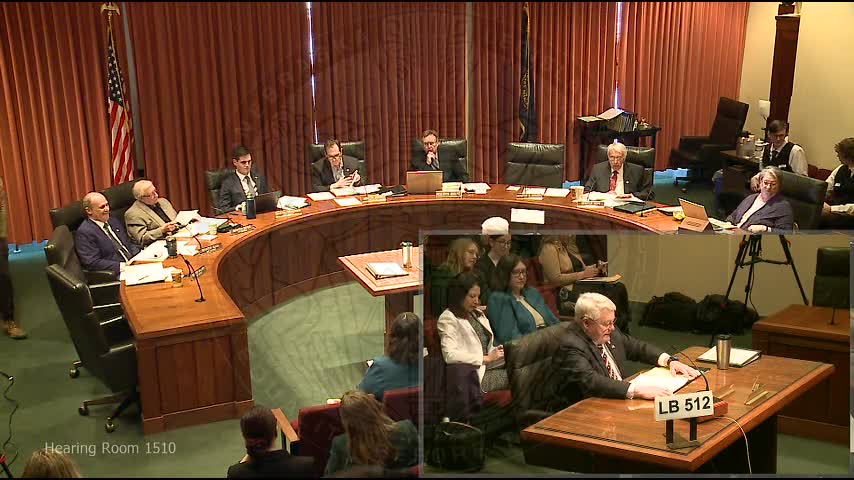Nebraska hearing on LB512 spotlights medication‑abortion safety, Bellevue inspection concerns
Get AI-powered insights, summaries, and transcripts
Subscribe
Summary
Lawmakers heard hours of pro and con testimony on LB512, a bill that would require in‑person screening and follow‑up for medication abortions and new reporting of complications after state inspectors flagged problems at a Bellevue clinic.
At a Health and Human Services Committee public hearing, legislators heard extended testimony for and against LB512, a bill that would require providers who prescribe abortion‑inducing drugs to confirm pregnancy and screen for ectopic pregnancy, offer a 3–14 day in‑person follow‑up, and report a defined set of adverse events to the Department of Health and Human Services.
The introducer, Senator Rick Holcroft, Legislative District 36, told the committee LB512 is a “first step towards establishing a basic minimum state standard of care.” He cited a 2023 facility inspection in Bellevue and said the bill responds to cases in which abortion drugs were dispensed without proper licensing and follow‑up. “No matter how any of us feels about the issue of abortion, we can all agree that no pregnant woman should ever be neglected or endangered by a careless abortion provider,” Holcroft said in his opening remarks.
The bill’s proponents, including the Department of Health and Human Services’ chief medical officer, Timothy Tesmer, M.D., told the committee medication abortions are widely used in Nebraska and that complications are difficult to measure without reporting requirements. “Mifepristone and misoprostol are approved by the Food and Drug Administration,” Dr. Tesmer said, and added that studies of emergency‑room visits show complication rates in the low single digits. He and other witnesses urged the committee to advance the bill so the state can collect standardized data and ensure basic clinical steps are followed.
Medical witnesses and patient advocates supporting LB512 described the Bellevue clinic’s inspection history and testified that inspectors found prescriptions dispensed without a required pharmacy‑dispensing license. Attorney Matt Heffron, representing a complainant, summarized inspection findings during a 3‑month sample and cited 229 prescriptions that, he said, were dispensed under problematic circumstances at that clinic. Testimony from local residents amplified concerns about physicians who travel from out of state to a clinic for brief periods and do not provide timely, in‑person follow‑up.
Opponents, led by medical organizations and practicing OB‑GYNs, said the bill inserts statutory medical requirements that conflict with clinical guidelines and established practice. Elizabeth Constance, M.D., a board‑certified OB‑GYN speaking for the Nebraska Medical Association, argued that “guidelines for medication abortion already exist” and warned that prescribing statute risks clashing with clinical judgment and specialty guidance. The American College of Obstetricians and Gynecologists (ACOG) section in Nebraska likewise opposed the bill, saying routine in‑person follow‑up is not medically necessary and that the bill’s reporting language is vague.
Planned Parenthood North Central States and other reproductive‑health groups told the committee LB512 would create burdensome, one‑size‑fits‑all mandates that especially affect rural patients who already travel long distances. They said Planned Parenthood and many clinicians already provide information, telephone follow‑up and in‑person care when needed, and that mandating a 3–14 day in‑person appointment would reduce access without improving safety.
Several physicians testifying on both sides noted the clinical overlap between medication abortion and medical management of pregnancy loss (miscarriage). Several opponents emphasized that the same drugs are used for miscarriage management and other indications, and that the bill’s definitions and reporting requirements could unintentionally affect routine miscarriage care.
The committee did not take a vote at the hearing. Senator Holcroft said he would work with committee members and staff on technical changes, including language in an amendment (AM209) that removes an initial RH‑testing requirement. The hearing record included extensive written exhibits and a wide mix of proponent, opponent and neutral testimony.
Why it matters: medication abortion accounted for roughly 80–82 percent of reported abortions in recent Nebraska state statistics cited at the hearing; proponents say statewide reporting and basic screening requirements would make care safer and make complication rates measurable. Opponents say the bill statutoryizes medical practice and would create new, unnecessary barriers to care and unintended consequences for miscarriage management.
Next steps: The committee did not vote and will decide whether to place LB512 on general file after any drafting changes and follow‑up from staff and agencies.
